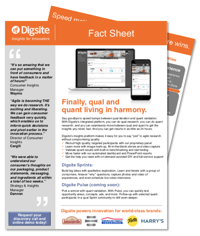Market research continues to evolve in exciting ways. New tools continue to develop, and platform capabilities are upgrading with better, faster and stronger features. The marketplace is flooded with these shiny tools that make market research look easy. But research expertise is still essential to help companies make the right decisions. All flash and no rigor will lead to bad research and sub-par business results.
So, what does it take to be a stellar researcher in today’s app-driven world? Here are some of the top traits that skilled, successful market researchers embrace:
1. Sharp analytical skills.
Whether you’re doing qualitative or quantitative work, you’re collecting a significant amount of data that needs to be translated into actionable insights. You need to examine the data in the context of your business issues and objectives to stay focused on meaningful insights and weed out the noise. Use AI and automation to help you speed up analysis and find areas to dig in deeper. Consider the “so what?” and “now what?” of your results to determine what is important and get beyond surface-level observations (instead of just what’s interesting).
2. Ability to build a story.
It takes a keen eye to spot patterns in data and identify meaningful themes or trends. Weaving a clear story from various bits of data keeps clients attuned to your findings, where they can see the greater picture being painted before their eyes. Insights stars know how to bring artifacts like quotes, videos or images into research to tell a story that numbers simply can’t. The result? Better, more informed decision making.
3. Highly communicative.
Today’s researchers are expected to be connoisseurs of the entire research process, including data collection. You need to be able to clearly communicate with your research participants, whether you’re moderating video interviews or messaging them in a research community. Engagement is a critical component of research quality, so remember to communicate early and often. Make them feel at home with a friendly tone and their guard will come down.
Decision makers are also expecting you to manage the details and provide them with strong insights. Keep in mind that you should be adapting your terminology to the audience you’re talking to. For example, the research term “monadic sequential” may not be appropriate for senior management discussions. You need to be able to navigate situations when the research actually delivers the statistical significance or meaningful differences you need, instead of when other factors outside the research may be more important to the overall decision.
4. Creative and adaptable.
You can develop a brilliant research plan, but you can’t prevent the unanticipated. Sometimes your results veer far from your hypothesis. Maybe you have a tough time recruiting your highly targeted research audience. Or maybe none of the concepts you’re testing are a hit with your research participants. In these cases, it’s important to have flexibility. Think about contingency plans upfront. Use methods that allow for iteration so you can build on what you learn.
Become more adaptable by building a toolset of research platforms that enable collaborative team learning, quickly flex between qual and quant insights and deliver rapid access to results. The goal is to seek progress over perfection. To really impress their clients, the most adaptable researchers can turn unexpected twists into opportunities for new and innovative solutions.
Here are some more Common Pitfalls of Agile Market Research to avoid.
5. Constantly curious.
Research is driven by a need for deeper insight. Great researchers always look beyond correlations to understand the root cause of a metric or behavior. They focus on the “why’s” over just measuring the “what.” You can’t design and build the best products if you guess what your customers want. It’s important to listen with curiosity in order to understand others, looking for inconsistencies or emotional triggers instead of just listening for what you want to hear.
As Dr. Arthur Aufderheide, famed paleopathologist and mummy researcher said, “All knowledge is connected to all other knowledge. The fun is in making the connections.” Great qualitative researchers will always try to improve their knowledge of research methods and search for new ways to innovate and drive the industry forward.
6. Consistently results-focused.
As a researcher, you start with the mystery. The decision maker is looking to the experts to help solve a problem. You should always adapt the research to the problem, rather than start with a research method and assume it is the best approach. Great researchers dig deeper into the questions and decisions they are trying to make. They adapt their work to the client’s needs to get the right mix of qualitative and quantitative input, rather than assuming the method up front.
Whether your client is looking for input to develop new products or positioning, iterate on concepts or seek feedback on purchase/use experience, you’ll need to narrow your approach and tools to use for a given project. Solid research recognizes the value of scoping the research to deliver clear direction on the decision at hand.
Read up on these 4 Success Stories to Inspire Your Research Approach.
The best researchers are driven by curiosity. Continue to build those stories that serve as the link between your audience and your decision maker. Remember, all market research comes down to human behavior and interaction. Set yourself up for success by embodying these traits, and you will soon be recognized as the research star you have become.
Want to learn more about Digsite’s flexible capabilities?

See the ways you can use Digsite to understand user needs more clearly and answer the "why" questions to design, build and iterate better products and services. Download our Fact Sheet for a complete overview of Digsite.




